Full Moon January 2026 – Wolf Moon And Alternative Names
Why is January's Full Moon is named after a wolf?
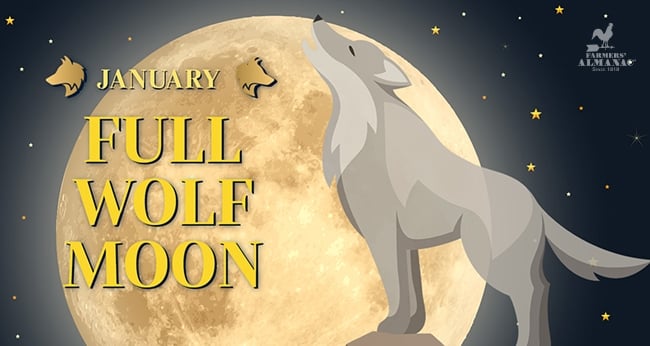
The full Moon in January happens when there are cold, long nights in the Northern Hemisphere, a time when the ground is frozen and winds whip the snow around. Trees and shrubs are deep into their dormancy and wildflower seeds await warmer weather to sprout. It’s time for the soil to rest before the next season of life-giving growth. Above ground, howls break the silent nights giving rise to a widely used name for January’s full Moon: the Wolf Moon.
Full Moon January 2026: Monday, January 13
Peak Illumination: 5:03 a.m. Eastern Time
Why Is The January Full Moon The Wolf Moon?
Between the haunting howls and deep-rooted mythology, the wolf is undoubtedly an iconic creature deserving of its association with the full Moon. The name for the January full Moon is believed to have originated from Celtic and Old English roots, which European settlers then brought to the New World.
No matter where the settlers landed in North America, they surely encountered the familiar call of the wolf. At one point, gray wolves were among the most widespread land mammals on our planet. According to the Wolf Conservation Center, gray wolves “inhabited most of the available land in the Northern Hemisphere.”
Habitat destruction and persecution by humans have reduced their range by about a third worldwide and 90 percent in the lower 48 states.
The wolf’s adaptable nature to survive in a wide range of habitats and ability to prey on the largest mammals living in those regions made it widespread. Basically, if there are enough deer, moose, elk, caribou, bison, and musk ox, wolves can survive. Predation of domestic animals caused friction with European settlers and early Americans who aggressively hunted the wolves.
Werewolf myths can be found in ancient Greek and Roman societies, throughout European history and among some Native American tribes. In modern storytelling the transformation from man to wolf has been closely tied to the full Moon in films like “The Wolf Man” and “American Werewolf In London.”
Howl at the Moon means to waste energy pursuing something unattainable. It’s shorthand for doing something crazy. However, howling is hardly a waste of energy among wolf packs. And they aren’t howling at the Moon. The Moon just happens to be shining during times when wolves most often howl.
A wolf’s howl can be heard miles away. The vocalization helps wolves locate separated members and even communicate between packs marking their territories. One study recorded spontaneous howls and responses happen most often between 11 p.m. and 6 a.m.
The cry of wolves doesn’t play into the Sioux name for the January full Moon, which is known as “The Time When Wolves Run Together.” Wolves do plenty of running to defend territory that can stretch hundreds of square miles to find enough prey to support the pack.
Alternative Names For January’s Full Moon
In other regions of the United States, different native peoples have various names for the January Moon. The Potawatomi in The Great Lakes refer to it as the “Bear Moon,” while the Haida in Alaska call it the “Bear Hunting Moon.” In The Pacific Northwest, the Tlingit know it as the “Goose Moon.”
Most other names for the Moon in January indicate the cold nature of the month. For example, the Celtic name is “Stay Home Moon,” the Algonquin name is “Sun Has Not Strength To Thaw Moon,” the Arapaho name is “When Snow Blows Like Spirits In The Wind Moon,” the Cherokee name is “Cold Moon,” the Cheyenne name is “Moon Of The Strong Cold,” and the Omaha name is “Moon When Snow Drifts Into Tipis.”
Join The Discussion
What is your favorite name for January’s full Moon?
If you could rename the Wolf Moon, what would you call it?
Related Articles
Subscribe To The Farmhouse – Our Members-only Community!

Daniel Higgins
Daniel Higgins is a lifestyle writer with two decades of experience who covers a wide variety of interests, from folklore to food and drink. Higgins writes for The New York Times, USA Today, and Yahoo News.


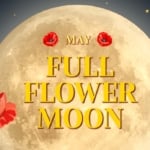
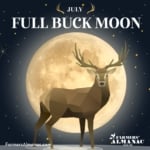
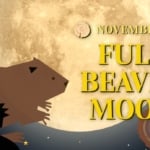
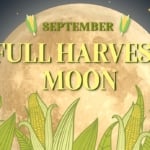
I love the Wolf Moon and Stay at Home Moon
Isn’t it the Wolf Conservation Center and not, as you have it, the Wolf Conversation Center? I admit, I did not click on the link but I have been to the Wolf Conservation Center!
Thank you! We made the edit!
I like the Cherokee name, Cold Moon” because it is COLD during January and I’m part Cherokee myself.
We love that name as well, but it is more widely used for December’s Full Moon.
I like the Wolf Moon much easier to say than the rest. Also more fitting for a representation of nature.
Interesting. I am a January 2nd, baby
A wealth of information for everyone.
Horoscopes are priceless and the moon phases
are interesting..
Today’s a full moon complete with gusty winds
and rain. Batten down the hatches!
Red skies at morning,sailors take warning.
It’s super fun, isn’t it, D3? Spread the word!
Love any, and all information on the moon and its phases. I am a July baby, also known as a moon child.
Me too am July baby 07/11
God has left us a wealth of information, love the way farmers use it, amazing.
I have been a fan of FA for manyyears both in print and now on line. I always check the FA for gradening info as well as weather for my area and of course I find wonderful recipes also. Thank you for all the wonderful information.
I always look forward to the full moon information you provide each month, as well as the many other bits of information.